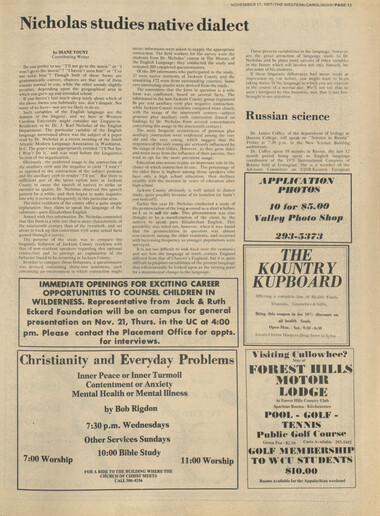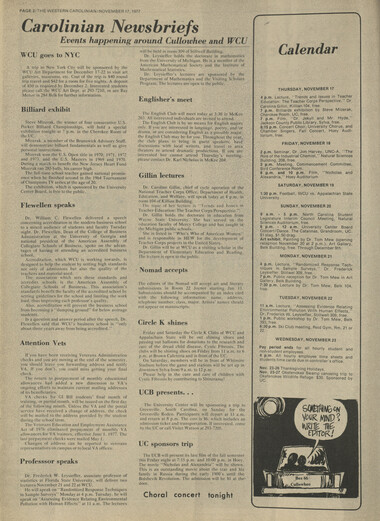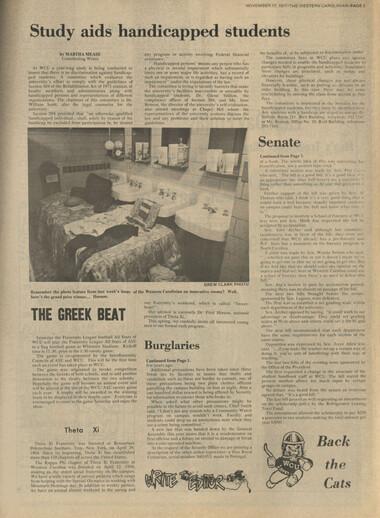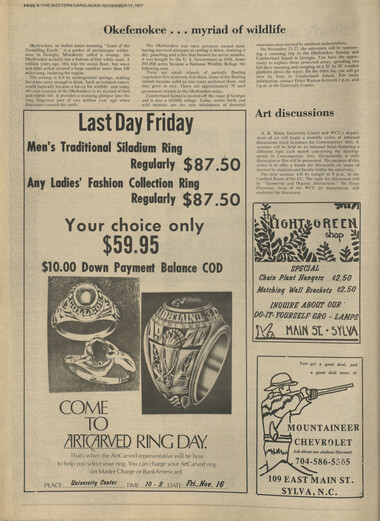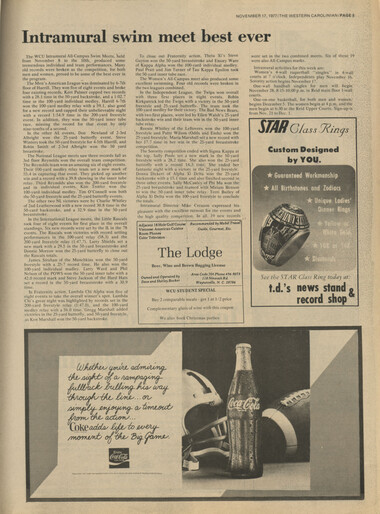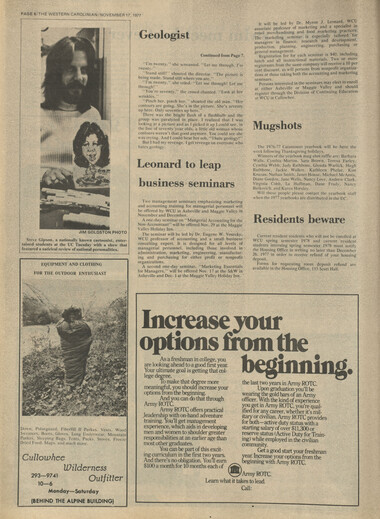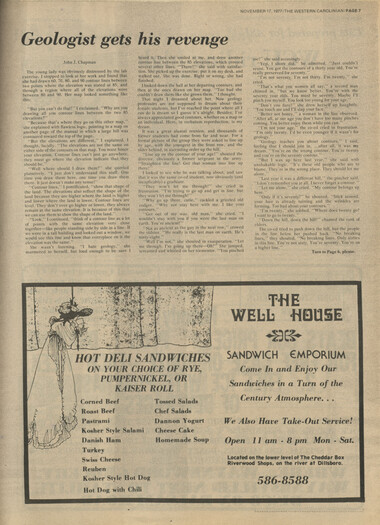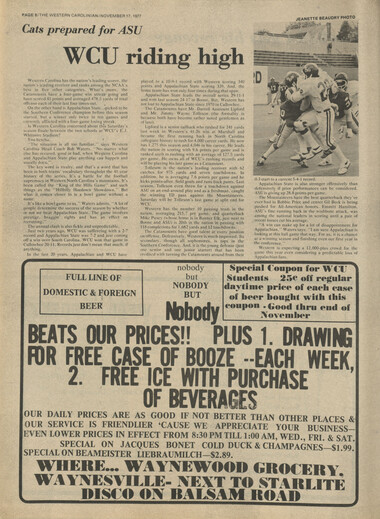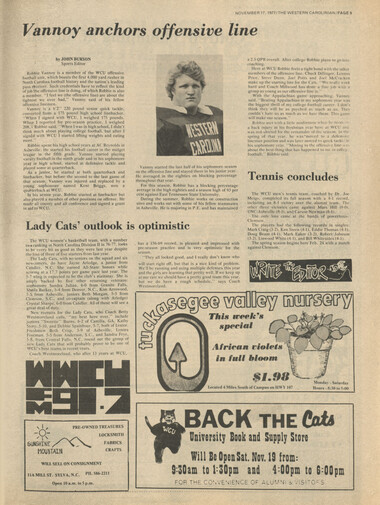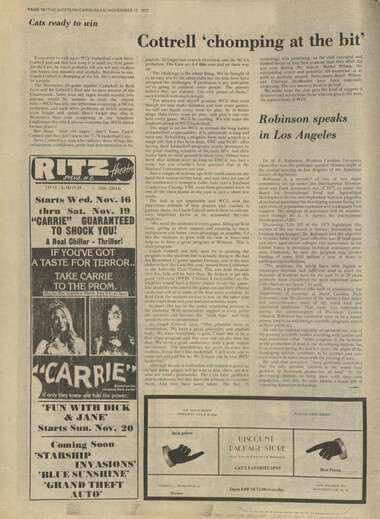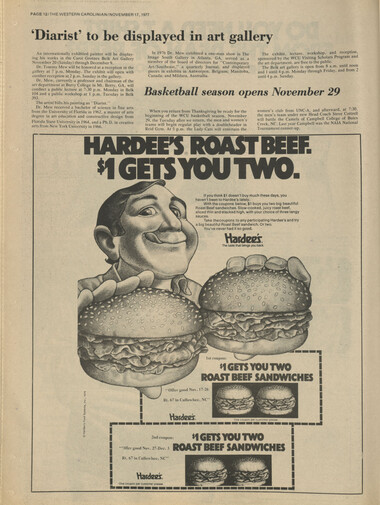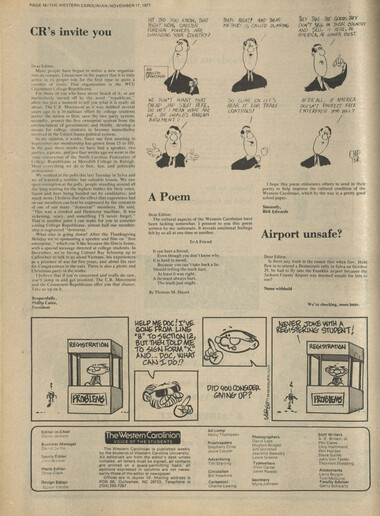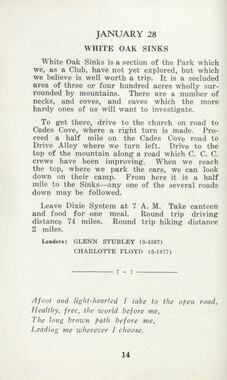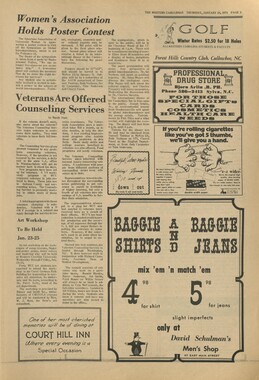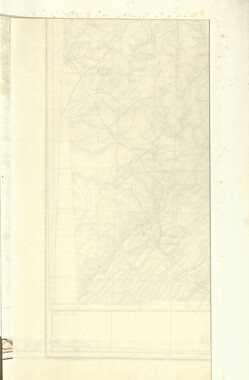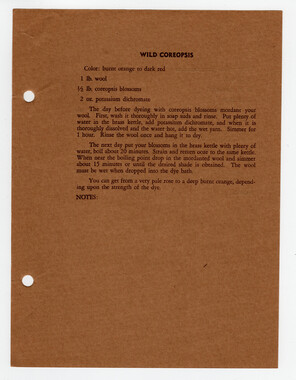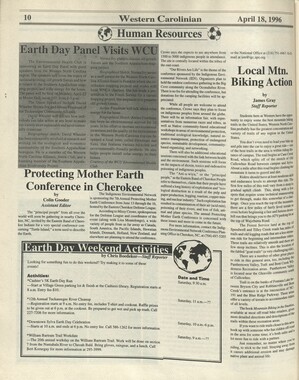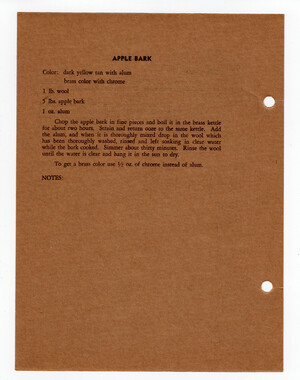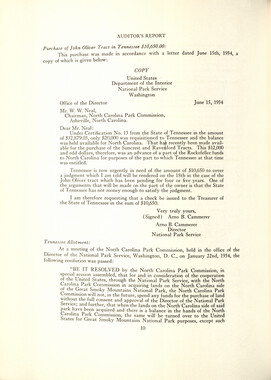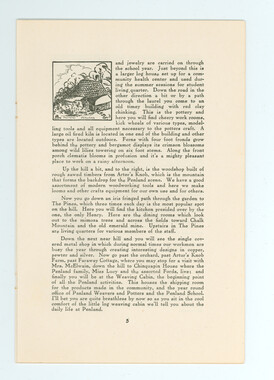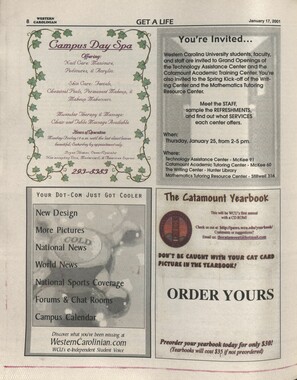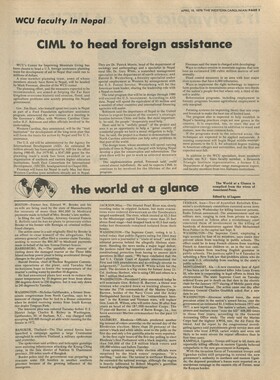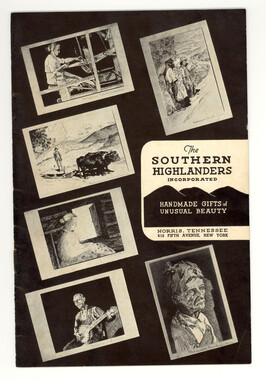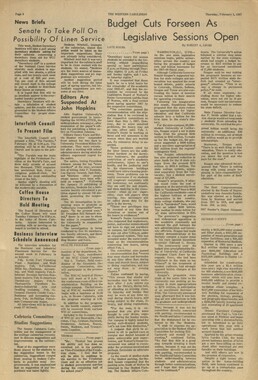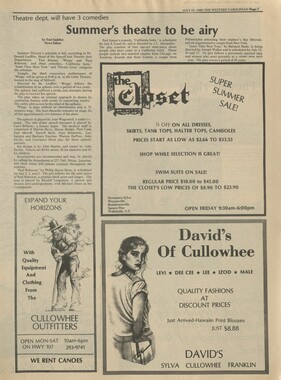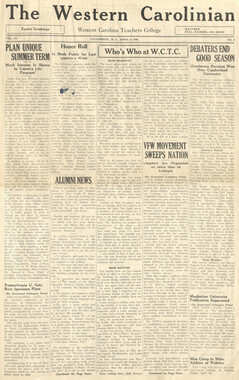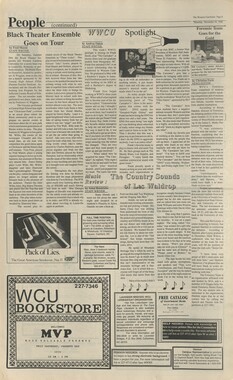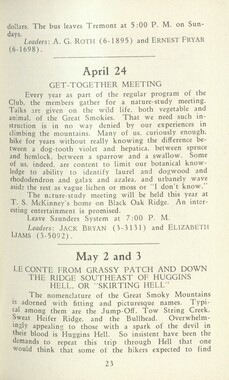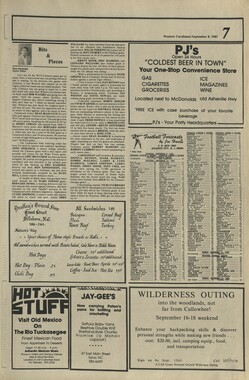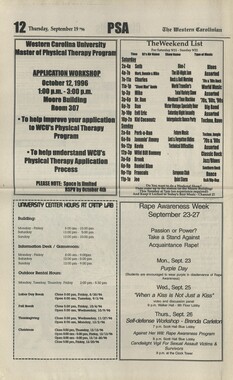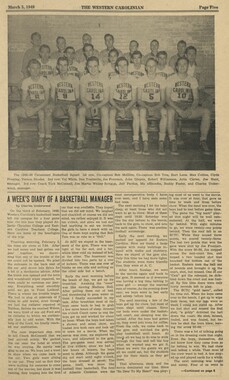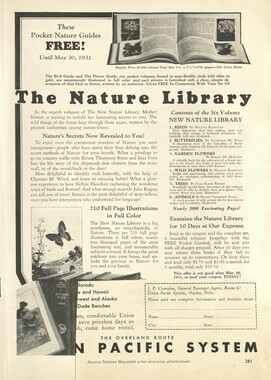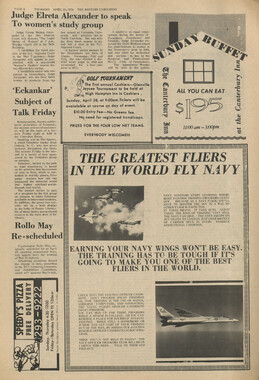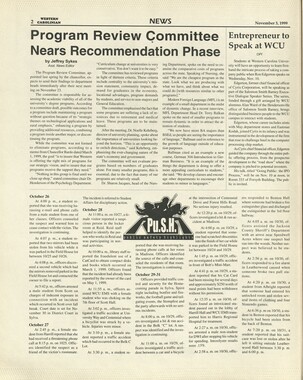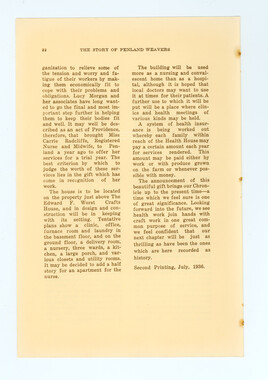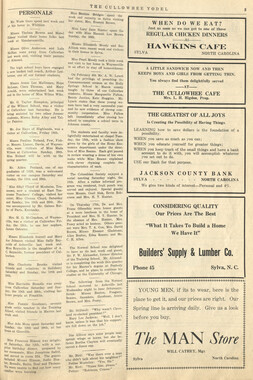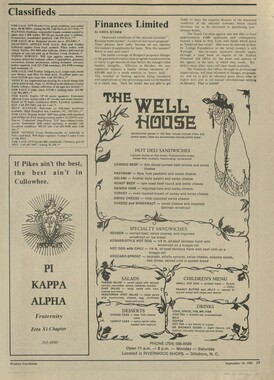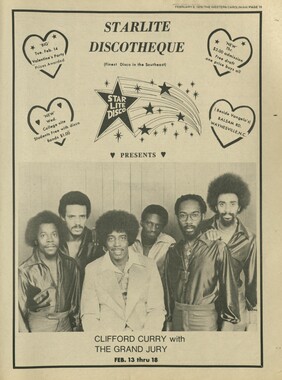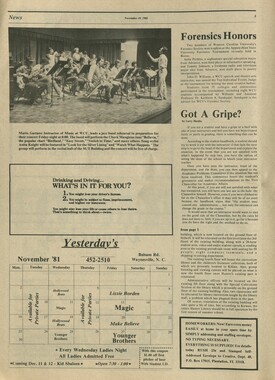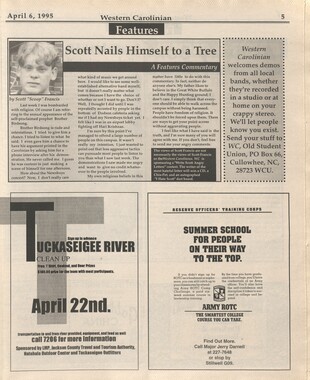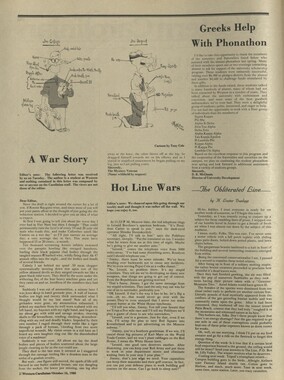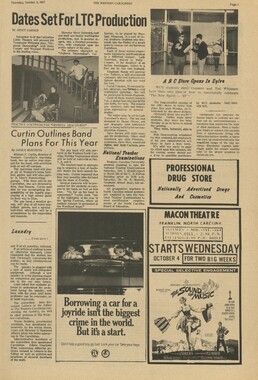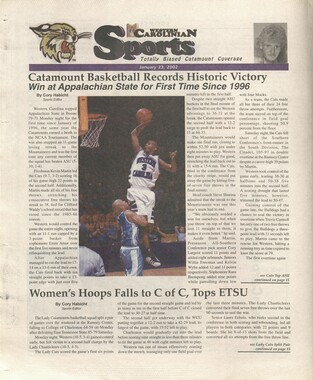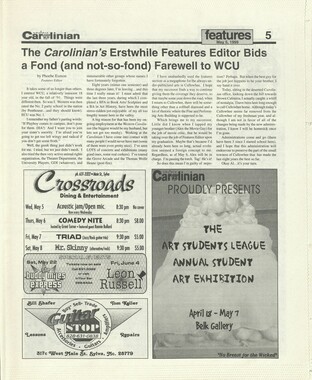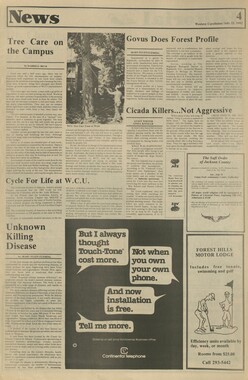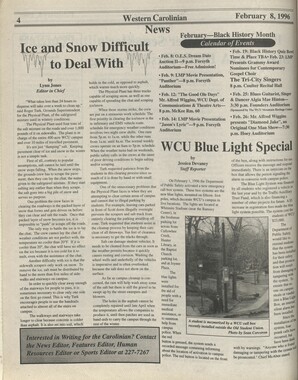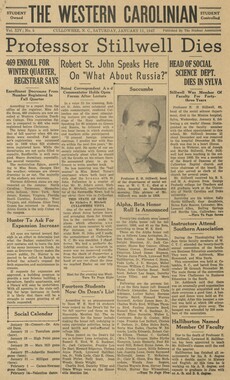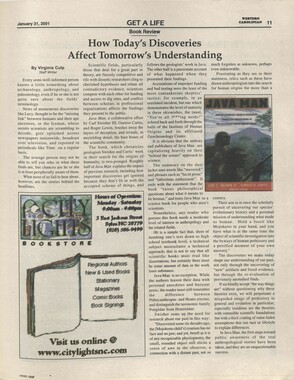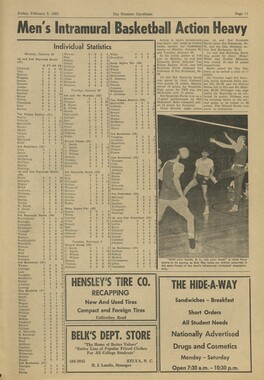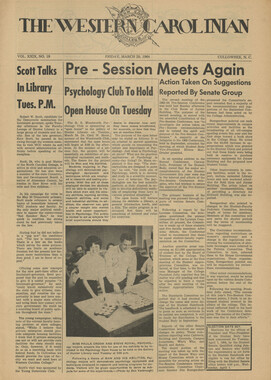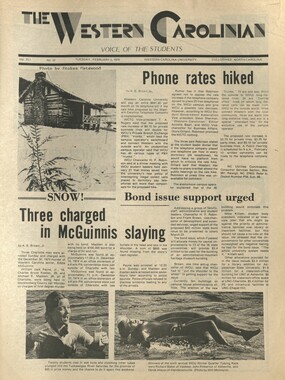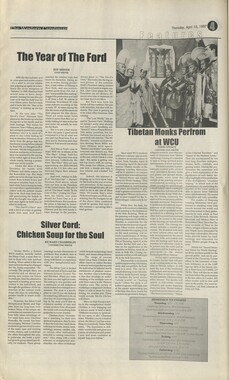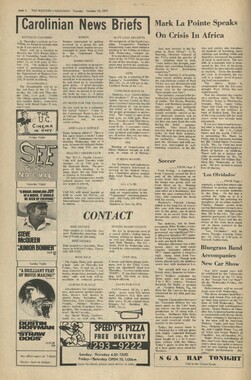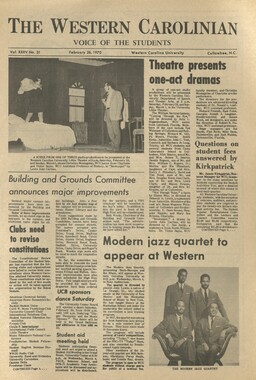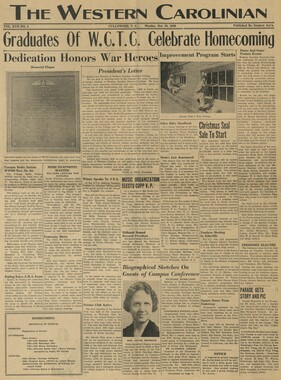Western Carolina University (20)
View all
- Canton Champion Fibre Company (2308)
- Cherokee Traditions (293)
- Civil War in Southern Appalachia (165)
- Craft Revival (1942)
- Great Smoky Mountains - A Park for America (2767)
- Highlights from Western Carolina University (430)
- Horace Kephart (941)
- Journeys Through Jackson (154)
- LGBTQIA+ Archive of Jackson County (26)
- Oral Histories of Western North Carolina (314)
- Picturing Appalachia (6772)
- Stories of Mountain Folk (413)
- Travel Western North Carolina (160)
- Western Carolina University Fine Art Museum Vitreograph Collection (129)
- Western Carolina University Herbarium (92)
- Western Carolina University: Making Memories (708)
- Western Carolina University Publications (2283)
- Western Carolina University Restricted Electronic Theses and Dissertations (146)
- Western North Carolina Regional Maps (71)
- World War II in Southern Appalachia (131)
University of North Carolina Asheville (6)
View all
- Allanstand Cottage Industries (62)
- Appalachian National Park Association (53)
- Bennett, Kelly, 1890-1974 (1388)
- Berry, Walter (76)
- Brasstown Carvers (40)
- Carver, George Washington, 1864?-1943 (26)
- Cathey, Joseph, 1803-1874 (1)
- Champion Fibre Company (233)
- Champion Paper and Fibre Company (297)
- Cherokee Indian Fair Association (16)
- Cherokee Language Program (22)
- Crowe, Amanda (40)
- Edmonston, Thomas Benton, 1842-1907 (7)
- Ensley, A. L. (Abraham Lincoln), 1865-1948 (275)
- Fromer, Irving Rhodes, 1913-1994 (70)
- George Butz (BFS 1907) (46)
- Goodrich, Frances Louisa (120)
- Grant, George Alexander, 1891-1964 (96)
- Heard, Marian Gladys (60)
- Kephart, Calvin, 1883-1969 (15)
- Kephart, Horace, 1862-1931 (313)
- Kephart, Laura, 1862-1954 (39)
- Laney, Gideon Thomas, 1889-1976 (439)
- Masa, George, 1881-1933 (61)
- McElhinney, William Julian, 1896-1953 (44)
- Niggli, Josephina, 1910-1983 (10)
- North Carolina Park Commission (105)
- Osborne, Kezia Stradley (9)
- Owens, Samuel Robert, 1918-1995 (11)
- Penland Weavers and Potters (36)
- Roberts, Vivienne (15)
- Roth, Albert, 1890-1974 (142)
- Schenck, Carl Alwin, 1868-1955 (1)
- Sherrill's Photography Studio (2565)
- Southern Highland Handicraft Guild (127)
- Southern Highlanders, Inc. (71)
- Stalcup, Jesse Bryson (46)
- Stearns, I. K. (213)
- Thompson, James Edward, 1880-1976 (226)
- United States. Indian Arts and Crafts Board (130)
- USFS (683)
- Vance, Zebulon Baird, 1830-1894 (1)
- Weaver, Zebulon, 1872-1948 (58)
- Western Carolina College (230)
- Western Carolina Teachers College (282)
- Western Carolina University (1794)
- Western Carolina University. Mountain Heritage Center (18)
- Whitman, Walt, 1819-1892 (10)
- Wilburn, Hiram Coleman, 1880-1967 (73)
- Williams, Isadora (3)
- Cain, Doreyl Ammons (0)
- Crittenden, Lorraine (0)
- Rhodes, Judy (0)
- Smith, Edward Clark (0)
- Appalachian Region, Southern (2399)
- Asheville (N.C.) (1917)
- Avery County (N.C.) (26)
- Blount County (Tenn.) (161)
- Buncombe County (N.C.) (1671)
- Cherokee County (N.C.) (283)
- Clay County (N.C.) (555)
- Graham County (N.C.) (233)
- Great Smoky Mountains National Park (N.C. and Tenn.) (510)
- Haywood County (N.C.) (3522)
- Henderson County (N.C.) (70)
- Jackson County (N.C.) (4692)
- Knox County (Tenn.) (25)
- Knoxville (Tenn.) (12)
- Lake Santeetlah (N.C.) (10)
- Macon County (N.C.) (420)
- Madison County (N.C.) (211)
- McDowell County (N.C.) (39)
- Mitchell County (N.C.) (132)
- Polk County (N.C.) (35)
- Qualla Boundary (981)
- Rutherford County (N.C.) (76)
- Swain County (N.C.) (2113)
- Transylvania County (N.C.) (247)
- Watauga County (N.C.) (12)
- Waynesville (N.C.) (73)
- Yancey County (N.C.) (72)
- Aerial Photographs (3)
- Aerial Views (60)
- Albums (books) (4)
- Articles (1)
- Artifacts (object Genre) (228)
- Bibliographies (1)
- Biography (general Genre) (2)
- Cards (information Artifacts) (38)
- Clippings (information Artifacts) (191)
- Crafts (art Genres) (622)
- Depictions (visual Works) (21)
- Design Drawings (1)
- Drawings (visual Works) (184)
- Envelopes (73)
- Facsimiles (reproductions) (1)
- Fiction (general Genre) (4)
- Financial Records (12)
- Fliers (printed Matter) (67)
- Glass Plate Negatives (381)
- Guidebooks (2)
- Internegatives (10)
- Interviews (812)
- Land Surveys (102)
- Letters (correspondence) (1013)
- Manuscripts (documents) (619)
- Maps (documents) (177)
- Memorandums (25)
- Minutes (administrative Records) (59)
- Negatives (photographs) (5835)
- Newsletters (1285)
- Newspapers (2)
- Occupation Currency (1)
- Paintings (visual Works) (1)
- Pen And Ink Drawings (1)
- Periodicals (193)
- Personal Narratives (10)
- Photographs (12976)
- Plans (maps) (1)
- Poetry (7)
- Portraits (1960)
- Postcards (329)
- Programs (documents) (151)
- Publications (documents) (2237)
- Questionnaires (65)
- Scrapbooks (282)
- Sheet Music (2)
- Slides (photographs) (402)
- Songs (musical Compositions) (2)
- Sound Recordings (796)
- Specimens (92)
- Speeches (documents) (15)
- Tintypes (photographs) (8)
- Transcripts (322)
- Video Recordings (physical Artifacts) (23)
- Vitreographs (129)
- Text Messages (0)
- A.L. Ensley Collection (275)
- Appalachian Industrial School Records (7)
- Appalachian National Park Association Records (336)
- Axley-Meroney Collection (2)
- Bayard Wootten Photograph Collection (20)
- Bethel Rural Community Organization Collection (7)
- Blumer Collection (5)
- C.W. Slagle Collection (20)
- Canton Area Historical Museum (2110)
- Carlos C. Campbell Collection (282)
- Cataloochee History Project (65)
- Cherokee Studies Collection (4)
- Daisy Dame Photograph Album (5)
- Daniel Boone VI Collection (1)
- Doris Ulmann Photograph Collection (112)
- Elizabeth H. Lasley Collection (1)
- Elizabeth Woolworth Szold Fleharty Collection (4)
- Frank Fry Collection (95)
- George Masa Collection (173)
- Gideon Laney Collection (452)
- Hazel Scarborough Collection (2)
- Hiram C. Wilburn Papers (28)
- Historic Photographs Collection (236)
- Horace Kephart Collection (861)
- Humbard Collection (33)
- Hunter and Weaver Families Collection (1)
- I. D. Blumenthal Collection (4)
- Isadora Williams Collection (4)
- Jesse Bryson Stalcup Collection (47)
- Jim Thompson Collection (224)
- John B. Battle Collection (7)
- John C. Campbell Folk School Records (80)
- John Parris Collection (6)
- Judaculla Rock project (2)
- Kelly Bennett Collection (1407)
- Love Family Papers (11)
- Major Wiley Parris Civil War Letters (3)
- Map Collection (12)
- McFee-Misemer Civil War Letters (34)
- Mountain Heritage Center Collection (4)
- Norburn - Robertson - Thomson Families Collection (44)
- Pauline Hood Collection (7)
- Pre-Guild Collection (2)
- Qualla Arts and Crafts Mutual Collection (12)
- R.A. Romanes Collection (681)
- Rosser H. Taylor Collection (1)
- Samuel Robert Owens Collection (94)
- Sara Madison Collection (144)
- Sherrill Studio Photo Collection (2558)
- Smoky Mountains Hiking Club Collection (616)
- Stories of Mountain Folk - Radio Programs (374)
- The Reporter, Western Carolina University (510)
- Venoy and Elizabeth Reed Collection (16)
- WCU Gender and Sexuality Oral History Project (32)
- WCU Mountain Heritage Center Oral Histories (25)
- WCU Oral History Collection - Mountain People, Mountain Lives (71)
- WCU Students Newspapers Collection (1744)
- Western North Carolina Tomorrow Black Oral History Project (69)
- William Williams Stringfield Collection (2)
- Zebulon Weaver Collection (109)
- African Americans (390)
- Appalachian Trail (35)
- Artisans (521)
- Cherokee art (84)
- Cherokee artists -- North Carolina (10)
- Cherokee language (21)
- Cherokee pottery (101)
- Cherokee women (208)
- Church buildings (167)
- Civilian Conservation Corps (U.S.) (110)
- College student newspapers and periodicals (1830)
- Dams (103)
- Dance (1023)
- Education (222)
- Floods (61)
- Folk music (1015)
- Forced removal, 1813-1903 (2)
- Forest conservation (220)
- Forests and forestry (921)
- Gender nonconformity (4)
- Great Smoky Mountains National Park (N.C. and Tenn.) (181)
- Hunting (38)
- Landscape photography (10)
- Logging (103)
- Maps (84)
- Mines and mineral resources (8)
- North Carolina -- Maps (18)
- Paper industry (38)
- Postcards (255)
- Pottery (135)
- Railroad trains (71)
- Rural electrification -- North Carolina, Western (3)
- School integration -- Southern States (2)
- Segregation -- North Carolina, Western (5)
- Slavery (5)
- Sports (452)
- Storytelling (245)
- Waterfalls -- Great Smoky Mountains (N.C. and Tenn.) (66)
- Weaving -- Appalachian Region, Southern (280)
- Wood-carving -- Appalachian Region, Southern (328)
- World War, 1939-1945 (173)
Western Carolinian Volume 43 Number 13
Item
Item’s are ‘child’ level descriptions to ‘parent’ objects, (e.g. one page of a whole book).
-
-
NOVEMBER 17. 1977/THE WESTERN CAROLINA Nicholas studies native dialect by DIANE YOUNT Contributing Writer Do vou prefer to say "I'll not go lo lhe movie" or "I won't go to the movie"? "1 haven't seen him" or "I've noi seen him'".' Though both of these forms arc grammatically correct, chances are that one of them sounds normal to you, while the other sounds slightly peculiar, depending upon the geographical area in which vou grew up and attended school. If you haven't lost much sleep lately about which of the above forms you habitually use. don't despair. Not many of us have—nor are we likely to do so. Such variables of the English language are the domain of the linguist, and we here al Western Carolina University might consider our Lingiiisl-in Residence to be Dr. J. Karl Nicholas of the English Department, lhe particular variable of the English language mentioned above was the subject of a paper read bv Dr. Nicholas at a recenl meeting of the South Atlantic Modern Language Association in Washinton, D.C I'he paper was appropriately entitled "I'll Not Say I Won't Do 11" and was read before the Linguistics the auxiliary verb and the negative to yield "I won't" as opposed to the contraction of the subject pronoun and lhe auxiliary verb to render "I'll not". But there is sufficient use of the latter option here in Jackson ( oiiniv lo cause the speech of natives to strike an outsider as quaint. Dr. Nicholas observed this speech patten) lor a while, and then began to make inquiries devised containing thirty-two sentences, each ; informants were asked to suppl) the appropriate in. lhe held workers lor the siuvcv were the Students from Dr. Nicholas' course in flu Hislorv ol the English language; thev conducted lhe studv and returned 2(r-) completed questionnaires. Of the 2(N informants who participated in the studv. 3.7 were native residents o| Jackson Countv and lhe remaining T2 were trom surrounding counties. Some verv interesting results were derived from the study. lhe contention that the form in question is a relic form was confirmed, based on several facts. I he informants in the ROM Jackson Count) group registered Kt> per cent auxiharv verb plus negative contraction, while Jackson County residents compared more closely with the usage ot the nineteenth century, subject pronoun plus auxiharv verb contraction (based on findings bv Dr. Nicholas from several concordances concerning this usage in the nineteenth century). lhe most frequent occurrences of pronoun phis auxiliary contraction were evidenced among the verv old and lhe very voting, which suggest that the responses of the verv young are seriously influenced bv the usage ol their elders. However, as thev grow older and move awav trom the influence of their parents, thev tend to opt for the more prevalent usage. Education also seems to play an important role in the choice ot which contraction lo use. The percentage ol the older form is highest among those speakers who have onlv a high school education, then declines steadilv with the increase in years ol education alter high school. Jackson County obviously is well suited to dialed studv. quite possiblv because of its isolation (or hadn't I .irlur this year Dr. Nicholas conducted a studv ot the pronunciation ol the long a sound as a short e before an 1. as m sell lor sale I his phenomenon was also thought to be a manifestation of the claim bv the natives lo speak pure Elizabethan English. This possibility was ruled out, however, when ii was found that the pronunciation in question was almost non-existent among the older residents, and occurred with increasing frequency as younger populations were II is nol loo difficult to look back over the centuries and sec how the language of tenth century England differed bom that ol Chaucer's England, but il is quite difficult to pinpoint variabilities of the present language that will eventual!), be looked upon as the turning pbjnl for a monumental change in the language. IMMEDIATE OPENINGS FOR EXCITING CAREER OPPORTUNITIES TO COUNSEL CHILDREN IN WILDERNESS. Representative from Jack & Ruth Eckerd Foundation will be on campus for general presentation on Nov. 21, Thurs. in the UC at 4:00 pm. Please contact the Placement Office for appts. for interviews. Christianity and Everyday Problems Inner Peace or Inner Turmoil Contentment or Anxiety Mental Health or Mental Illness by Bob Rigdon 7:30 p.m. Wednesdays Other Services Sundays 10:00 Bible Study 7:00 Worship 11:00 Worship FOR A RIDE TO THE BUILDING WHERE THE CHURCH OF CHRIST MEETS CALL 586-4336 I licse present variabilities in lhe language, he are the great attraction Ot language studv Nicholas and he plans more surverv ot othct va in the future which will involve nol onlv himsi also sonic of his students. II these linguistic differences had uevci hi taking notice ol the language .ini.il dav aren't intrigued bv tins busine broughl loom attention. e'll 1 llkil Russian science Dr. Janice Coffey, ol the department of biofogj a Queens College, will speak on "Science in Russia' Iriilav at 7:30 p.m. in the New Science Building Hi t ollev spent 18 months in Russia, lhe last C month period being spent as Lnulish lai coordinator of the ITS International Congress ot Hotanv held al Leningrad. She is a membei ol the Advisory Committee on L'SSR-Eastorn European ArrLHATlOX PHOTOS IO for $X.OO Yalleu Vhoto Shop 293-537:1 THE KOUNTRY KUPBOARD Bring this coupon in for 10 disco all health foods Open Men, - Sat. 9:30 - 6:30 Located below Hoopers Drug Store 111 Visitin» Cullowhee? FOREST HILLS MOTOlt LODGE At Forest Hills Country Club Spacious Rooms - Kilchenelles POOL - GOLF - TENIMS Public <.oli Course Green Fee-$2.50 Cans Available 293-5442 GOLF MEMBERSHIP Town fvnuEvrs 810.00 Rooms av ailablc for the Appalachian weekend
Object
Object’s are ‘parent’ level descriptions to ‘children’ items, (e.g. a book with pages).
-
The Western Carolinian is Western Carolina University’s student-run newspaper. The paper was published as the Cullowhee Yodel from 1924 to 1931 before changing its name to The Western Carolinian in 1933.
-
